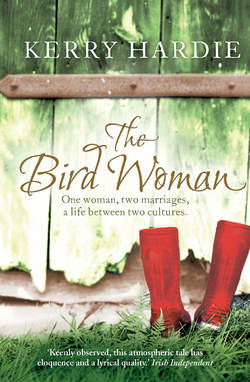Читать книгу The Bird Woman - Kerry Hardie - Страница 15
Chapter 9
ОглавлениеThere was a young one working in the supermarket in the town, a girl of maybe nineteen or twenty years of age. The first time I saw her I couldn’t get over her; I had to force myself not to stand and gawp, for she was the living, breathing spit of Robbie poured into a female form. After a while I got more used to seeing her, didn’t get the same shock. All the same, I could never entirely just shrug and pass her by.
One morning I was over at the fruit and veg picking out onions, and there she was, up ahead of me, lifting bunches of bananas from a box on a trolley and setting them out on the shelf. She turned and glanced in my direction. Her face was a Pierrot’s—a dead-white, painted-on, chalky mask. I looked around, but no one else was staring. Maybe there was something going on that I hadn’t heard about, some children’s thing in the town to do with face painting or mime. She was a bit old for face painting, but it could be she was the face painter and she’d used some on herself as well…
I went back to the onions, keeping my eyes to myself, concentrating, for I knew there was something up and I was growing afraid. When I’d finished with the onions I moved on to the carrots, then the mushrooms, then I started in on the fruit. The hairs on the back of my neck had risen, so I let myself sneak another wee look to find out what she was at. The thick white paint had entirely gone; her face was back to being pink and normal.
I knew right away that it was Robbie, but I tried to pretend to myself that it wasn’t, for I didn’t want what I knew. All day I was jumpy and tense with waiting, but nothing happened. When I found I was sticking close to the phone, I took myself out to the garden and made myself dig and rake.
Liam came home and found me out there, and he was delighted with all the work I’d done.
“You must have a few farm genes in you after all,” he said. “From that crowd up in Dunnamanagh, your mother’s people.”
The phone rang at nine. I picked it up, and it was my mother, telling me Robbie was dead. It seems he was driving someone else’s car—too fast and too full of drink most likely—and he’d smacked it into a wall and killed himself and the girl who was sitting beside him. My mother said that his sister Rita had phoned her; she’d said to be sure to let me know the funeral was in two days’ time.
“Why would she want you to let me know?” I asked her. “I’d left him, hadn’t I? They surely don’t want me there at the grave?”
“You’re not thinking of going?” Her question came sudden and fierce down the line.
“Why are you telling me if you don’t want me to go?”
She didn’t answer, and I didn’t expect her to. She was phoning because I was Robbie’s wife still. Phoning me so I’d know she’d been right all along.
But she needn’t have worried, I didn’t want to see them bury Robbie, I didn’t want to go back to the North. But I sent flowers, yellow freesias, which have the sweetest scent I know and a shape like a promise if promises had shapes. I wept for him then, and I wept for Barbara Allen, and if I’d known how I’d grieve for him in the weeks to come I’d have gone to the funeral as well. I didn’t regret him, you see, and I thought that because there was no regret I wouldn’t have to remember.
I was wrong. The minute his coffin was safe in the ground some wall came crashing down inside me and my body was filled with a longing so physical and intense that it felt like pain. I thought of Robbie, his brown eyes and his brown hair and his strong, whippy body so different from Liam’s, and my heart fairly broke. I wanted to see him one more time, to be in his company one more time; I wanted things to be as they’d been back then, when he was my song and I was his, and the song that we sang together was who we were when we sang it.
It had taken me a year to do it, but I’d written at last to Robbie. I’d told him where I was and that I would sign any papers he cared to send my way. I never had an answer—I didn’t expect one—I knew that my letter would make him angry and remind him when he wanted to forget. But when I heard of his death, I was glad that I’d sent it. Sometimes silence can be every bit as bad as the worst of words.
When the grieving came on me I had to endure it. I couldn’t stop it or change it by act of will. No more could Liam. At the start he had moved to comfort me, but I’d turned away from him, for I couldn’t bear his touch.
Then when it had passed I tried to reach him, but he wouldn’t let me back. At first I thought that his distance would go once I’d drawn him into sex, but it didn’t. I couldn’t understand that: how could he make love with his body while his mind stayed cold and apart? Making love for me was all of myself. We went together into the Garden, we lost ourselves and remade ourselves, and afterwards everything started afresh.
